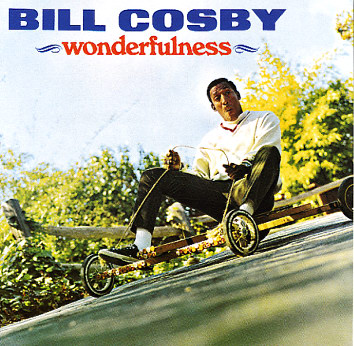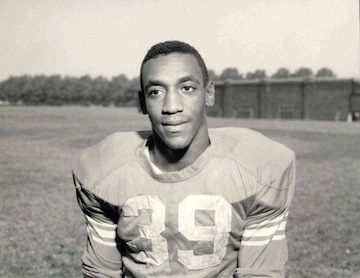With a personal wealth once estimated at $400 million, television star Bill Cosby can certainly afford a long-running interlocutory appeal. The rich irony is that the Philadelphia street urchins like Fat Albert and Weird Harold, whose stories propelled Cosby to fortune and fame from his street days in Philadelphia, probably could never afford such an appeal.
Comedian Bill Cosby built a smart and wildly successful career making light of the underside of life in Pennsylvania, particularly street life in Philadelphia.

Cover from Cosby’s 1966 comedy album, Wonderfulness, which contains the Philadelphia story Chicken Heart. ‘Wonderfulness’ is a catch-phrase from Cosby’s first TV series, I Spy.
Now at the end of his career, Cosby’s life has become a sad slapstick and pratfall routine involving the worst practices of Pennsylvania courts and law enforcement.
Late last week Cosby’s lawyers filed notice that they intend to appeal a Montgomery County, PA, judge’s order that the comedian stand trial for alleged sexual misconduct.
Cosby’s planned appeal strikes to the heart of several of the worst problems in Pennsylvania’s court system: the influence of politics, wealth, and unwritten backroom deals.
Cosby says he was given an oral promise in 2005 by a previous Montgomery County DA, Bruce Castor, that he would not be criminally prosecuted for the alleged drugging and sexual assault of a Temple University athletic employee. In return, Cosby’s lawyers say, the comedian agreed to sit for a deposition in a civil suit brought by the woman.
Making matters worse, Cosby also hopes to complain on appeal that the current Montgomery County district attorney, Kevin Steele, is improperly prosecuting the comedian for political gain. While running against Castor for DA last year, Steele ran election ads criticizing Castor’s previous handling of Cosby’s case. Steele promised, if elected, to bring criminal charges against Cosby.
So while there are legal issues involved, there are also political and social issues raised by the Cosby case.
Cosby’s lawyers late last week filed for what’s called an “interlocutory appeal” with the trial judge and the state Superior Court to throw out Cosby’s case.
Unlike most appeals, which are filed at the end of a trial, interlocutory appeals in Pennsylvania courts are filed in the middle or start of a case to settle outstanding legal issues and disputes. (In federal court cases, these are called discretionary appeals.)
Interlocutory or discretionary appeals are filed when there remains an important question or undecided point of law before a lower court which, if left unchallenged, can harm or prejudice a defendant or litigant at trial.
Up till now, probably the best-known example of an interlocutory appeal in Pennsylvania courts concerns the criminal case of Penn State administrators Graham Spanier, Tim Curley and Gary Schultz.
Spanier, Schultz and Curley’s criminal case has been tied up for years by an interlocutory appeal in state court on the question of whether their attorney, Cynthia Baldwin, violated her attorney-client relationship and harmed her client. Earlier this month the three former PSU administrators won a round on interlocutory appeal in Superior Court, but the state attorney general’s office has appealed that ruling, and so the case remains tied up.
Obviously, many low-income or indigent defendants cannot afford a long-running interlocutory appeal. Defendants represented by a public defender, for example, hardly ever see an interlocutory appeal, even when there are important issues at hand, like an illegal search warrant, or court or prosecutorial chicanery.
With a personal wealth once estimated at $400 million, television star Bill Cosby can certainly afford a long-running interlocutory appeal. The rich irony is that the Philadelphia street urchins like Fat Albert and Weird Harold — whose stories propelled Cosby to fortune and fame from his street days in Philadelphia — probably could never afford such an appeal.
The trial court judge, or an appeals court, must first approve interlocutory appeals before they can proceed. Otherwise, the case goes straight to trial. Just this week, on Tuesday, the Montgomery County trial court judge handling the preliminaries of Cosby’s case refused to grant Cosby’s request for an interlocutory appeal. So the ball is now in Superior Court. Stay tuned.
Legal questions aside, all this carries with it important social issues.
The Cosby and Spanier cases suggest a two-tiered justice system. Those with financial resources receive a much different standard of “justice” than the less-well heeled. Should the rich get all the justice they can afford, while the poor must settle for much less? How is that equal justice?
The Cosby case also shines a harsh spotlight on an important political issue. Do we really want people prosecuted or jailed by election campaign? Pennsylvania needs a law to prohibit district attorneys like Steele from making campaign promises to prosecute particular cases. This after all is justice we’re supposedly talking about, not carnival barking.
The Pennsylvania justice system has become awash in politics, and reforms are badly needed to get politics out of our justice system.
What will happen in the Cosby case, and his request by interlocutory appeal to throw out the case against him?
The prevailing opinion among court watchers is that Cosby deserves to have his interlocutory appeal heard, but that he will probably lose the appeal.
The legal problem for Cosby is that any supposed deal made between his lawyer and the Montgomery County DA in 2005 should have been approved and formalized by a judge’s consent decree, which never happened. Both DA Castor and Cosby’s lawyer should have known this, and both should have known better.
Cosby’s lawyer at the time should never have allowed the comedian to be deposed in the civil case; the deposition from the civil case is now being used to bring the criminal charges against Cosby.
Under these circumstances, a defense attorney and even a DA could face discipline from an appeals court for the sort of unconventional deal, approved by no judge, that was supposedly brokered in 2005 in Cosby’s case.
Making matters even more convoluted, Cosby’s lawyer who brokered the deal in 2005 recently died, so he won’t be facing any court discipline or sanctions.
The question would remain: was Bill Cosby so hurt by his own lawyer’s potential malpractice that the case should be thrown out?
If so, Bill Cosby has even more in common with Graham Spanier, Gary Schultz and Tim Curley.
In many ways, the decline and fall of comedian Bill Cosby closely mirrors the decline and fall of politics and courts in his home state, Pennsylvania.
Over the years, with the murder of his son, and now this, Bill Cosby’s life has indeed become a personal tragedy — for both himself and his alleged victims. But our declining justice system is also a tragedy.
An old friend of mine who’s now in his eighties remembers frequenting a Philadelphia nightclub in the early 1960s where he used to encounter an up-and-coming young comic named Bill Cosby, who worked as a bartender. Cosby would tell funny stories and jokes as he hustled behind the bar, pouring drinks, watching his tip jar fill up.
My friend says he would chat with Cosby while the then-unknown comedian poured drinks.
“Bill Cosby was a bright and funny young man,” my friend remembers. “He obviously he had a future beyond tending bar.”
“A product of grinding poverty,” The New York Times relates, “Cosby escaped his rundown Philadelphia neighborhood by dropping out of high school and joining the navy. He earned his diploma via correspondence course, then earned a football scholarship to Temple University. Working nights as a bartender, Cosby discovered he had the ability to make people laugh, so he temporarily shelved his plans to become an athletics teacher and set out to become a nightclub comedian.”
It’s worth remembering, while he faces perhaps his final stand-up act before Pennsylvania courts:
Cosby’s roots in Pennsylvania run deep. Bill Cosby is not only one of the most successful entertainers in American show business history. He’s also one of Pennsylvania’s most successful sons.
Now, at the end of his life, due to allegations that he drugged and raped women, Cosby faces his ruin here in Pennsylvania, where it all started for him.
Regardless of what happens, it looks like Bill Cosby will close out his career, and perhaps his life, in a game of “buck buck” with Pennsylvania courts.
Bill Cosby is at once a Pennsylvania success story, and a Pennsylvania tragedy.
The fall of Bill Cosby, like the decline in our justice system, is a true Pennsylvania story.



In a criminal proceeding, the accuser must prove the accused guilty. In a civil matter it is essentially reversed in that the accused must prove the accuser wrong. When the DA in 2005 made the agreement, that should have ended any criminal proceedings for that case. The accuser was, presumably, in agreeance with that decision (likely to obtain a financial settlement). Unfortunately, for both sides, the attorney’s handling the issue apparently slept through the law school class where they are taught “If it isn’t in writing it didn’t happen”.
Fast forward to 2013 and all these women coming forward making claims (some of which don’t remotely match an actual timeline – another issue for a later date) and the new DA sees an opportunity to use the case – prior agreed upon by his opponent – to use a political fodder. The accuser has agreed to testify, thus the suit rises for the civil matters issues. I
t’s a very convoluted legal cesspool, and the politics of the PA judicial system only make it more so.
It is also a sign of the decline of Integrity. We have always had blatant and shameless corruption in our society, but never as blatantly and shamelessly obvious as it is currently.